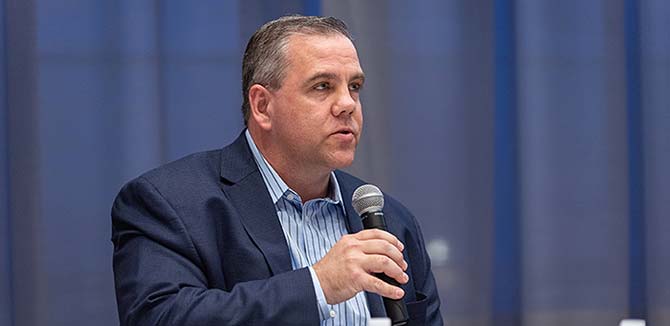An Employer's Perspective on Looking for Leadership
Steve Sharpe of PharmaACE talked with Master of Biotechnology program (MBP) students about what he looks for in potential job applicants.
PharmaACE promotes itself as operating at "the intersection of science, data, technology and business strategy." The company is young, yet it is striving to become the premier forecasting consulting firm within the pharmaceutical industry.
Steve Sharpe is the client partner for PharmaACE's largest U.S. account, and he also is in charge of U.S. recruitment activities and plays a prominent role in developing and delivering training for PharmaACE employees and clients.
Sharpe visited Northwestern Engineering's Master of Biotechnology program (MBP) earlier this year to talk with students about his company, his career, and how they can stand out in the job market as part of the program's Biotech-Nexus event. When asked what he looks for in a prospective hire, Sharpe stressed two words: leadership and communications.
"We recruit for leaders, and we recruit for very strong communication abilities," Sharpe said. "Eventually, we want someone who comes on board with us to rise up and become an engagement manager, where they’re leading an on-site and off-shore team of maybe 10 or 15 individuals and they’re a key business partner to the client.
"They’re going to senior-level meetings and advising senior level stakeholders on investment decisions. We need to recruit for a type of talent that can grow into that type of person."
MBP students develop their leadership and communication skills in Critical Thinking and Communication as well as Team Dynamic and Leadership, both of which are required courses. These classes were developed and added to the curriculum in response to input from the program's Industrial Advisory Board members about what skills are most important for success in biotechnology careers.
When it comes to communications, Sharpe said he looks for someone who will be able to ask the right questions when necessary. As for leadership, he explained that there are multiple types of leaders he covets. The first example is someone who can be a thought leader within the organization.
Sharpe explained that when PharmaACE does interviews, they consist of multiple phases. In one phase, the company provides a case study, and job candidates are asked a series of questions to see how they think through a problem and what types of questions they ask.
"Can they make an assumption on their own and go with it?" he said. "Can they develop a framework on the fly? We try to get inside their head and understand how they think."
The second type of leader is one who is able to inspire those around them. To find that leader, Sharpe asks what types of clubs and organizations the applicant is involved in and what their exact role is within the group.
In one instance, Sharpe found out that an applicant worked with a charitable organization in India where they provided solar-powered lights to rural villages so that children could do their homework at night. The applicant organized a team of peers to go out and distribute the lights in the most effective way possible.
"We're looking for that type of leadership as well," Sharpe said, "where you can marshal different resources, inspire people to do big things, and also deliver."


